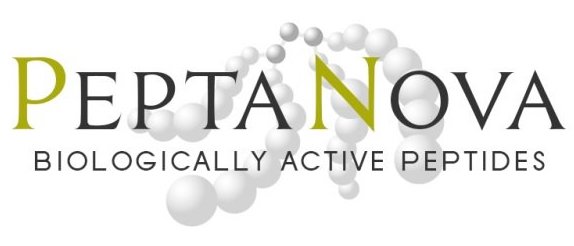Peptide YY (Human, 3 – 36)
PYY (Human, 3 – 36)
4400-v 0.5 mg | 275.00 EUR
Ile- Lys- Pro- Glu- Ala- Pro- Gly- Glu- Asp- Ala- Ser- Pro- Glu- Glu- Leu- Asn- Arg- Tyr- Tyr- Ala- Ser- Leu- Arg- His- Tyr- Leu- Asn- Leu- Val- Thr- Arg- Gln- Arg- Tyr- NH2
| (M.W. 4049.5) | C180H279N53O54 |
Synthetic Product
The purity is guaranteed to be higher than 99% by HPLC
Peptide YY (3-36) /Physiological Inhibitor for Food Intake / NPY Y2-Receptor Agonist
Food intake is regulated by many peptides and proteins, and the majority of orexigenic and anorectic effects elicited by these factors are mediated through their action within the brain. However, the origin of these peptidic factors is not necessarily in the brain. For example, the major producing organ of Ghrelin [Code 4372-s (human) and code 4373-s (rat)], one of the recently discovered orexigenic peptides, is the stomach. More recently, Peptide YY [PYY (3-36)] has been designated as a new member of this family of satiety peptides [Nature, 418, 650 (2002)].
PYY (3-36) is a gut-derived endogenous peptide [Peptides, 10, 797 (1989)], which is secreted postprandially. When PYY (3-36) was injected peripherally in rats in doses of 0.3 µg per 100 g (body weight), its plasma concentration increased to the normal postprandial range and food intake was significantly suppressed. Direct central administration of this peptide into the arcuate nucleus also inhibited food consumption. PYY (3-36) is a well-known agonist for NPY Y2 receptor (Y2R) [Am. J. Physiol., 279, G126 (2000), Int. J. Obes., 26, 281 (2002)]. Although the Y2R was not thought to be significantly involved in NPY-induced food intake, a recent report has clarified its importance in body weight regulation [Proc. Natl. Acad. Sci. U.S.A., 99, 8938 (2002)]. Interestingly, no feeding inhibition by PYY (3-36) was detected in a Y2R-deficient mouse. Furthermore, the anorectic effect of PYY (3-36) was seen in humans upon infusion (0.8 pmol per kg per min) for 90 min: food intake suppression by 33% was observed in the 24 h period*. The newly observed functions of PYY (3-36), especially through a Y2R-dependent mechanism, should shed light on the ongoing question of body weight control.
* Please note: All the peptides delivered by PeptaNova including PYY (3-36) are not for human consumption.
References:
- G.A. Eberlein, V.E. Eysselein, M. Schaeffer, P. Layer, D. Grandt, H. Goebell, W. Niebel, M. Davis, T.D. Lee, J.E. Shively and J.R. Reeve Jr., Peptides, 10, 797 (1986) (Original; Endogenous Form)
- D.A. Keire, P. Mannon, M. Kobayashi, J.H. Walsh, T.E. Solomon and J.R. Reeve, Jr., Am. J. Physiol., 279, G126 (2000) (Original; NPY Y2 Receptor Selectivity)
- R.L. Batterham, M.A. Cowley, C.J. Small, H. Herzog, M.A. Cohen, C.L. Dakin, A.M. Wren, A.E. Brynes, M.J. Low, M.A. Ghatei, R.D. Cone, and S.R. Bloom, Jr., Nature, 418, 650 (2002) (Original; Inhibition of Food Intake)
- S. Chamorro, O. Della-Zuana, J.-L. Fauchére, M. Félétou, J.-P. Galizzi and N. Levens, Int. J. Obes, 26, 281 (2002) (Review; Y2R Selectivity)

